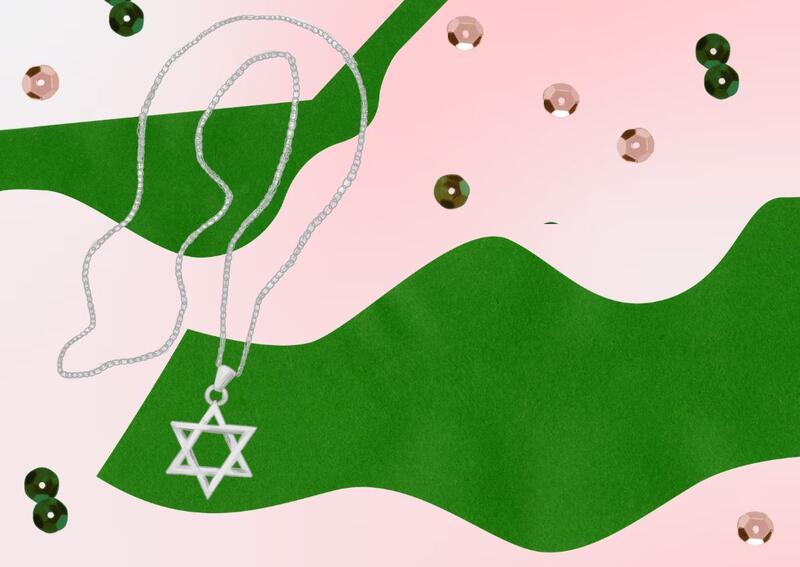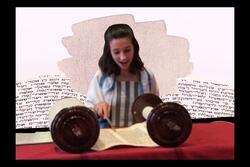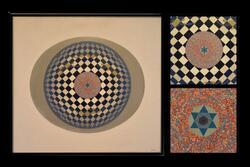Connecting Across Generations Through My Star of David
Every day I wear my silver Star of David. It dangles unceremoniously on my neck from a ratty chain that is in dire need of replacement. It's not a particularly stunning piece of jewelry—though I recently bedazzled the star with a green stone I found in a jewelry shop—and the metal even gives me a rash. The star is neither a recognized ritual object nor does it provide any functional use besides making my neck itch. Nonetheless, I wear my silver Star of David every day.
I received the gift from my great aunt Barbara for my bat mitzvah in October 2021. Because the COVID-19 pandemic prevented her from attending, Aunt Barbara mailed this silver Star of David charm to me in a plain white envelope. I was surprised, quite frankly, at the gift. She is my bubbe’s sister, and I had no recollection or memory of her, only my bubbe’s passing references to their childhood. Still, I wear the necklace every day.
When I first began wearing it, I sensed that it held some importance. I could not quite understand why yet—after all, I was 13. Over the past few years wearing the star, I have not undergone a specific, particularly enlightening or transformative experience that has revealed why I felt, and still feel, compelled to wear this piece of jewelry daily. Rather, I have gradually become conscious of what being “Jewish” means to me. I have begun to organize my reasons for wearing the star into two core values: family and feminism.
I began forging my Jewish identity as I prepared for my bat mitzvah and my d’var torah about processing the death of my grandfather. My Torah portion was Chayei Sarah, which translates to “the life of Sarah.”
In this parshah, Sarah dies. Her grieving husband Abraham needs to find a way to move on from her death while also giving proper recognition to her memory. Later, when Abraham dies, his family members come together to remember him. Even though they were estranged, Ishmael and Isaac bury their father together.
As a 13-year-old, what spoke to me about this passage was the idea of preserving the memory of deceased family members and, through that act of preservation, ultimately keeping a piece of them alive. As I reflected on this portion, I came to the conclusion that there is something eternal about family. When tragedy strikes, family comes together to comfort and keep the memory of lost ones alive. Conversely, family is also the first to celebrate you when there is a landmark in your life or even just something to be happy about.
I believe that this is true of the family one chooses as well. In the four years since my bat mitzvah, I have learned how to celebrate Judaism in the context of family. With every passing year that the star lays on my neck, I place more and more value on using Jewish holidays and celebrations to visit and connect with family.
Indeed, the importance of family and community has been with me my entire life. It is not just a realization that dawned on me after embracing the “hidden” and “mysterious” magical powers that my Star of David granted (a compelling plot for the sequel of You’re So Not Invited to My Bat Mitzvah). Rather, Aunt Barbara’s gift helped me see that my family is what has connected me to my Jewishness throughout my life. I know my third cousins because I went to their bar and bat mitzvahs. I know the cousins of my cousins and I see my extended family every year for some holiday or another. Aunt Barbara’s gift embodies my relationship to Judaism: it’s about family.
It is especially meaningful to have received the necklace from Aunt Barbara considering that she was not able to have a bat mitzvah herself. Even though she had been left out of Jewish spaces as a girl, she still invited me into them. Through wearing the star, I am carrying on a tradition of women in my family making space for themselves in Judaism.
I recognize that I am blessed with a loving, supportive, and large family. I know that family is a gift and an ideal many must work hard to create. Therefore, I find that wearing my star becomes even more crucial, displaying the beauty and wonder of family because Aunt Barbara felt compelled to celebrate my bat mitzvah with me despite not knowing me well.
I finally met my great aunt Barbara at the bat mitzvah of my middle sister, Lily, less than a year ago. She was very pleased to see me wearing her gift. She gave a star to Lily, and my youngest sister, Emma, as well. Aunt Barbara left Emma with a note, justifying her early gift because she was not certain that she would make it to Emma’s bat mitzvah in three years. I realized, at that moment, how important it was to Aunt Barbara that she was able to give us these gifts and that she was able to continue a tradition. She found it necessary to maintain her connection with us, beyond distance and ultimately, beyond death. Aunt Barbara gave—and continues to give—Lily, Emma, and me the opportunity to forge our own Jewish identities, with the help of a simple, silver, Star of David.
This piece was written as part of JWA’s Rising Voices Fellowship.







